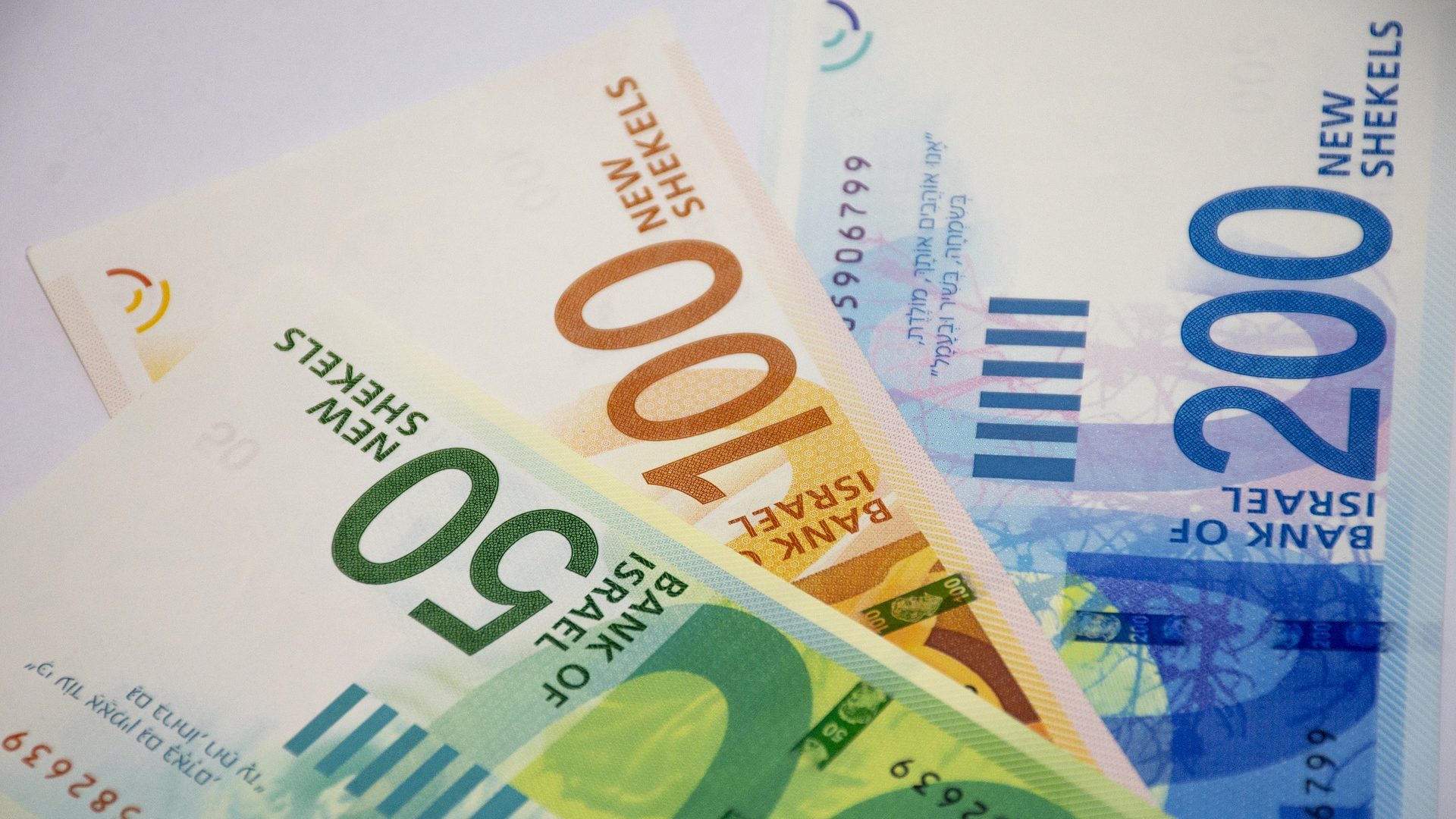Israel’s Credit Rate Lowered by Moody’s as Uncertainty Over Economic and Political Future Continues
Moody's downgraded Israel's credit rating due to war with Hamas and political instability. The economic outlook shifts to negative, with concerns over the conflict's impact and government responses
Israel’s credit rating was lowered by the US ratings agency Moody’s over the weekend, citing the instability caused by Israel’s ongoing war with Hamas in Gaza. The rating was downgraded from A1 to A2.
“The ongoing military conflict with Hamas, its aftermath and wider consequences materially raise political risk for Israel, as well as weaken its executive and legislative institutions and its fiscal strength, for the foreseeable future,” read the statement from Moody’s.
The agency also changed the outlook for the Israeli economy to “negative” from “stable” due to the risk of an additional escalation with the Lebanese-based Hizbullah terrorist organization on Israel’s northern border.
ALREADY ON TROUBLED WATERS, ISRAELI LEADERS DISMISS CONCERN
The credit rating, given by several rating firms throughout the year, is an assessment of a government’s credibility regarding its financial obligations and debt. Last year, several agencies warned Israel that its ratings could be at risk because of a government plan to implement a sweeping reform of the judicial system and the domestic unrest that followed. These warnings came before the war, which erupted on Oct. 7, 2023, with a surprise offensive by Hamas on Israel.
“Credit rankings change through time in order to reflect current economic conditions, and they are usually backward-looking, reflecting things that have already occurred,” said Prof. Ilan Alon, Dean of the School of Economics at The College of Management.
According to Alon, Israel’s total debt is “very favorable” at 64% of its Gross Domestic Product (GDP) compared to other OECD (Organization for Economic Co-operation and Development) countries, making its ability to pay debt good.
“The credit rating change reflects the deterioration of underlying conditions,” Alon told The Media Line. “Both the intensity and the length of the conflict will continuously affect Israel’s credit ranking, political stability, and its ability to rebound quickly.”
Israeli Prime Minister Benjamin Netanyahu and Finance Minister Bezalel Smotrich downplayed the report by Moody’s.
“The Israeli economy is strong. The rating downgrade is not connected to the economy. It is entirely due to the fact that we are in a war,” Netanyahu said. “The rating will go back up the moment we win the war — and we will win the war.”
Smotrich slammed the report, saying it was politically motivated.
“The announcement does not include any serious economic arguments, but is a pure political manifest based on a pessimist and detached geopolitical perception that reflects lack of faith in Israel’s resilience.”
AFTER A TOUGH YEAR, MORE TROUBLE FOR ISRAEL’S TECH SECTOR
The main engine of Israel’s economy is its hi-tech sector, which has enjoyed a lengthy period of growth. The economy relies heavily on its hi-tech sector for foreign investment. According to the Central Bureau of Statistics, approximately half of foreign capital entering Israel is funneled to tech
firms. According to the Israel Innovation Authority, the volume of investments in Israel dipped by 45% since the second half of 2022, a trend that continued in 2023, in which Israeli tech companies reported negative returns compared to other tech companies traded on the NASDAQ.
Give the gift of hope
We practice what we preach:
accurate, fearless journalism. But we can't do it alone.
- On the ground in Gaza, Syria, Israel, Egypt, Pakistan, and more
- Our program trained more than 100 journalists
- Calling out fake news and reporting real facts
- On the ground in Gaza, Syria, Israel, Egypt, Pakistan, and more
- Our program trained more than 100 journalists
- Calling out fake news and reporting real facts
Join us.
Support The Media Line. Save democracy.
“The report is water under the bridge, and people and institutions will react as they see fit,” said Yoav Tzruya, General Partner at Jerusalem Venture Partners (JVP). “Probably the most problematic is the combination of the negative outlook with the lack of any proper management of the situation.”
MOODY’S NEGATIVE OUTLOOK AND GOVERNMENT RESPONSE LEAVE LITTLE ROOM FOR OPTIMISM
It is the uncertainty that economists and markets are most averse to.
“What is most apparent from the report is the concern that the government will be able to bring the country back on course,” said Dani Catarivas, President of the Israeli Federation of bi-national Chambers of Commerce.
The new credit rating will likely increase the credit the Israeli government pays on money it raises abroad. It came just days after the coalition began the legislative process on an amended annual budget, which included far-reaching changes due to the war effort. An across-the-board 3% budget cut for almost all ministries is expected in order to partially fund the spike in defense expenditure. In addition, the government is expected to increase VAT by one percent in 2025.
“The money has to come from somewhere,” said Alon, who expected the cost of the war to increase and become a larger percentage of Israel’s GDP. “That is not going away.”
There was criticism from the opposition and leading figures in the Israeli economy regarding the updated budget. There was an expectation that the coalition would close unnecessary ministries that were created only to satiate some of Netanyahu’s political partners. In addition, only a small amount of discretionary funds that were made available to those partners was cut.
“One cannot say this is a budget that deals head-on with the challenges,” Catarivas told The Media Line. “The budget needs to be geared to growth engines; that money needs to be invested that will guarantee the continued growth of the economy.”
“The balance between expenditure and income was not necessarily reached by purely economic motives, but rather there is too much politics in the budget in order to maintain the coalition,” he added.
Netanyahu’s government was already under public heat for the promotion of the contentious judicial overhaul before the war broke out. The attack by Hamas, which stunned Israel and exposed a major military and political blunder, has increased public dissatisfaction with the government. Netanyahu’s approval ratings are at an all-time low, and he is now struggling to maintain his position, desperately seeking to secure the support of his allies.
Some of his most senior allies are ultra-Orthodox, or Haredi, Jewish parties who represent a population that has a significantly lower rate of participation in the workforce. Some of the budget has been allocated to continue funding Haredi education systems, which do not teach core curriculum subjects such as math and English, perpetuating their inability to be incorporated into the workforce. Making up almost 14% of Israel’s population, their lack of employment is a significant impediment to Israel’s growth.
“It is hard to increase fiscal spending and increase on the same level the amount of government revenue,” said Alon. “Increasing the labor force can help the economy quite a lot. Those populations need to be incentivized to work.”
THE DOMINO EFFECT
The downgraded credit rating and the continuance of the war will likely set in motion a domino effect on the Israeli economy.
“The immediate effect will be on the borrowing costs; the country will have to pay more interest due to the higher risk profile, and this will trickle down to everyone,” Alon said. “The government will have to increase the money supply to pay some of that interest back, which will affect inflation that will then affect the public’s purchasing power and liquidity.”
For the hi-tech sector, the concern is immense.
“The last 18 months were not an ideal period for the sector,” Tzruya explained. “As global interest rates went up, the expected risk-adjusted returns went up as well. The Israeli-tech sector was able to provide increased returns but found itself stretched to the limit.”
This limit is now being stretched further.
“It started to be too much,” Tzruya told The Media Line. According to him, the Moody’s report will now make it increasingly difficult to raise funds for the tech sector.
“It gives formal representation to the risk that can now be quantified and cannot be ignored,” he said. “Combined with the negative outlook, the risk has gone up dramatically, and it will get worse.”
Foreign pension funds and other state actors who may have previously invested in Israeli hi-tech may now not be allowed to with an officially downgraded credit rating. Israeli tech companies traded publicly in the US and elsewhere could see a dip in their value in the very near future.
MORE TAXES?
The government will likely spend less money on the public and with the increase in taxes, Israel’s economy is expected to shrink, as will its quality of life.
According to the OECD, Israel is already one of the countries with the lowest public expenditure per capita. With only 37.4 percent of its GDP in 2022 going to public goods and services, this number could now decrease.
“It will now take longer for Israel to close this gap; we are only going backward instead of forward,” said Catarivas.
A recent survey conducted by the Israel Democracy Institute showed that the overwhelming majority of Israelis are in favor of closing superfluous ministries and cutting the budget in order to prevent an increase in national debt.
“There is no doubt that the security budgets need to grow at the expense of something, but the balance needs to be found between the expenses and the income,” said Catarivas. “We do not want to dramatically raise taxes because this hurts the resilience of the growth engines.”
According to Alon, raising taxes would be a bad idea. Already in 2023, Israel found itself embroiled in an unprecedented political crisis, sparking concerns about the potential ripple effects on its economy. This means that prior to the outbreak of the war in October, the economy was already operating under significant uncertainty, a pet peeve for investors. Compounded by the global slowdown in 2023 and rampant inflation, the war only added to the mounting challenges facing the Israeli economy, hindering its recovery.
While seemingly relieving the budget deficit problem, it will also worsen the recession,” he said. “You should never tax at a time of hard economic conditions because that basically worsens those conditions. When people are struggling, you don’t want to raise taxes.”
The other credit agencies, such as S&P Global and Fitch, are expected to give their updated credit ratings in the coming weeks. They will likely follow Moody’s, spelling further trouble for Israel’s economy.





